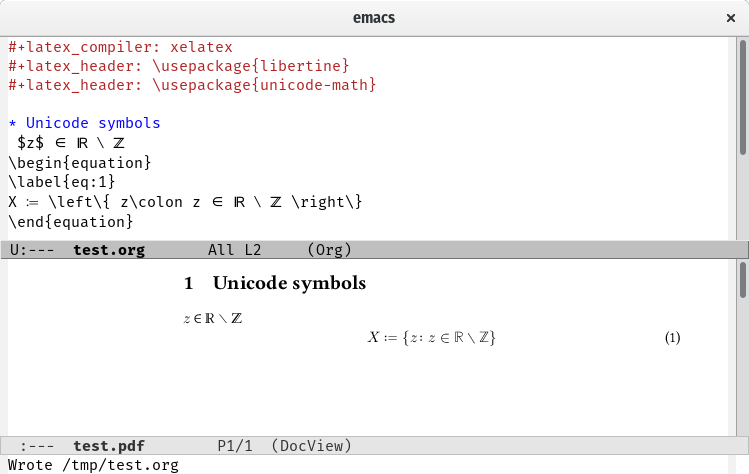Hello Good people of Emacs!
I'm having trouble exporting unicode math symbols from buffer (org-mode) to pdf file.
1. Problem Description:
Symbols are inserted to the buffer as unicode characters (via TEX input method or company-math)
Here is source code demonstration:
#+TITLE: Unicode characters export test
#+AUThor:
#+date:
Unicode characters:
ℝ ℤ ℕ ⇒ ∈ ∀
Same symbols in latex format:
$$\Bbb{R} \Bbb{Z} \Bbb{N} \Rightarrow \in \forall$$
Produced .tex file includes unicode symbols:
% Created 2016-03-04 Pá 21:01
\documentclass[11pt]{article}
\usepackage[utf8]{inputenc}
\usepackage[T1]{fontenc}
\usepackage{fixltx2e}
\usepackage{graphicx}
\usepackage{longtable}
\usepackage{float}
\usepackage{wrapfig}
\usepackage{rotating}
\usepackage[normalem]{ulem}
\usepackage{amsmath}
\usepackage{textcomp}
\usepackage{marvosym}
\usepackage{wasysym}
\usepackage{amssymb}
\usepackage{hyperref}
\tolerance=1000
\date{}
\title{Unicode characters export test}
\hypersetup{
pdfkeywords={},
pdfsubject={},
pdfcreator={Emacs 24.4.1 (Org mode 8.2.10)}}
\begin{document}
\maketitle
\tableofcontents
Unicode characters:
ℝ ℤ ℕ ⇒ ∈ ∀
Same symbols in latex format:
$$\Bbb{R} \Bbb{Z} \Bbb{N} \Rightarrow \in \forall$$
% Emacs 24.4.1 (Org mode 8.2.10)
\end{document}
Pdf file does not :
2. Things I have tried so far:
Xelatex and unicode-math: This is included in answer from Rasmus. Here I have to admit: I'm not using development version of org-mode he's mentioning. (failed to install it) I've tried xelatex adn unicode-math anyway. My version of Org mode is 8.2.10.
#+latex_compiler: xelatex
#+latex_header: \usepackage{libertine}
#+latex_header: \usepackage{unicode-math}
Including this in file introduces not so lovely message instead pdf file.
org-latex-compile: PDF file ./unicode_export_test.pdf wasn't produced: [package error]
I have checked for correct unicode-math installation:
~ $ kpsewhich unicode-math.sty
/usr/share/texlive/texmf-dist/tex/latex/unicode-math/unicode-math.sty
Installation of Xelatex is the newest version:
~ $ sudo apt-get install texlive-xetex
Reading package lists... Done
Building dependency tree
Reading state information... Done
texlive-xetex is already the newest version.
0 upgraded, 0 newly installed, 0 to remove and 16 not upgraded.
install development version of org-mode: (failed) Following How do I keep current with bleeding edge development? - tutorial I have been able (I think) download it and compile it. Since I have no idea how to tell to Emacs run this version, Emacs runs Org-mode version 8.2.10 (release_8.2.10 @ /usr/local/share/emacs/24.4/lisp/org/). I have tried to add following lines to my config.
(add-to-list 'load-path (expand-file-name "~/elisp/org-mode/lisp"))
(remove 'load-path (expand-file-name "/usr/local/share/emacs/24.4/lisp/org/"))
(add-to-list 'auto-mode-alist '("\\.\\(org\\|org_archive\\|txt\\)$" . org-mode))
(require 'org)
Without pleasing result.
Searching internet: Solution was not found.
Beating my self for being stupid: Didn't help.
3. Question: How to export unicode characters from org-mode to pdf?
- Do I have to configure some org-mode variable?
- Compile with different Latex interpreter?
- Any other ideas?
- If development version fixes this.... How can I install it?


